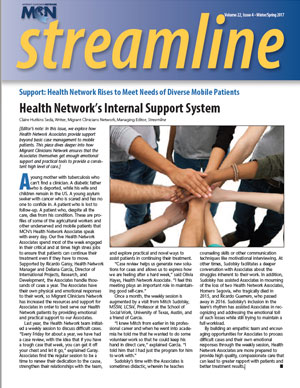Expecting a Baby, Experiencing Depression: Health Network Case Study

By Olivia Garcia, Health Network Associate
Maya*, an agricultural worker, had a one-month-old healthy newborn when I first spoke with her. Her previous case manager at Health Network, Alma, had gone on maternity leave, so I took Maya’s case. It’s clear that Maya and her previous case manager had bonded over their pregnancies, but Maya was very grateful for the continued assistance after the birth of her baby boy.
A clinic in a Southern US state had originally enrolled Maya in Health Network in September 2015, to help her continue to get prenatal care as she moved regularly to keep up with the harvests throughout the Eastern Seaboard. Alma called Maya right after she received the enrollment forms, to introduce herself and Health Network. Maya was responsive from the very beginning. She told us she was moving to another state in the South in two weeks. Like most agricultural workers, she didn’t have the address of the farm on hand. Even after she moved, she wasn’t able to give us the address of where she was working. We had to wait a few weeks before the farm managers gave her the address. Alma got Maya her first appointment shortly after getting the address.
After that initial move, Maya moved three more times, every three weeks, to different farms within that same state. Each time she moved, Alma assisted in finding and contacting a new clinic, moving her health records, and communicating closely with Maya. The third time that Maya moved, Alma encountered issues with the local county health department. They didn’t want to send Health Network Maya’s medical records — so they printed them out and gave them to Maya. She took them on her own to the next clinic. It took multiple calls on Alma’s part to get the medical records sent to the next place properly.
Shortly after her first appointment, Maya confided in Alma that she was struggling with depression. Alma encouraged her to seek treatment, and helped her find a therapist. Maya visited a mental health specialist at one of the clinics — but she did not like the experience, telling Alma that she felt like the providers weren’t listening to her. Alma continued to encourage her to seek treatment, but Maya refused. Alma made sure that Maya spoke about these issues with her clinician during her prenatal appointments. Maya missed several appointments due to her depression, and told Alma that she just didn’t feel motivated to go.
During her sixth month of pregnancy, Maya called Alma to express her fear that her baby wasn’t moving. Alma encouraged her to get to the clinic immediately. Luckily, the baby was healthy. Maya confessed to Alma that she had fears about her baby’s health because she lost a child several years before. She was not motivated to eat enough, she said, but she knew she should for the baby.
Maya moved again, to a third state along the Eastern Seaboard. She stayed one month in her next location, but she refused to go to the clinic against Alma’s advice. She wanted to establish herself in the hospital at her next location in the same state where she planned to have the baby. She had lived there before, and had developed a relationship with the local clinic; she also had friends in the community for postpartum support.
After six moves in a few months, Maya gave birth to a healthy baby. Typically, for prenatal cases in Health Network, the case is closed after the mother gives birth — but Alma recognized that Maya had significant mental health issues that required further attention. Her case was shifted into the general health category. Shortly thereafter, I took over the case.
Maya was appreciative that we were keeping the case open. After birth, her Medicaid coverage expired, and she wanted more information on sliding scale fees for health care in her location. She talked to me about her problems, how she was feeling, and her sadness. But she never thought that she needed help for her depression. She didn’t think she needed counseling or medication. Because of her poor experience with the mental health clinician in her previous state, she was disheartened by the situation. We talked about her problems and accessing care repeatedly. I told her there were different options, like group counseling for families battling the grief of losing a child. Mostly, I think she just enjoyed talking to me on a regular basis — someone caring for her, checking up on her.
I continued the monthly check-in. I found her a clinic to visit for her depression, but she turned down the appointment because she thought the sliding fee scale was too high. After the baby was a few months old, Maya reported to me that her depression had improved. She wasn’t working, but staying home to care for her baby, who was healthy and growing fast.
At the end of August, Maya called me to inform me that she was moving back to her hometown in Central America. Two months later, I called her to check in with her for the last time. She had moved in with her mom and was feeling a lot better. She said she didn’t think she was going to move back to the States and she felt like she was in a good place for herself and for her child. I let her know that if she moved back, we could work with a clinic in her country or in the US to get her re-enrolled if she had any ongoing health issues. She was happy with all the time we had spent helping her. Although Maya refused the mental health services that we strongly recommended, she was able to confide in Health Network Associates to talk through some of her issues, showing that sometimes having a person who will listen and care goes a long way. Maya was no longer moving. I closed her case confident that she had better control of her depression and was in a place where she could best care for her baby with less worry.
* All names, locations, and dates have been changed to protect the identity of the patient.
Read this article in the Spring 2017 issue of Streamline here!
Sign up for our eNewsletter to receive bimonthly news from MCN, including announcements of the next Streamline.
Return to the Streamline Spring 2017 Table of Contents.
